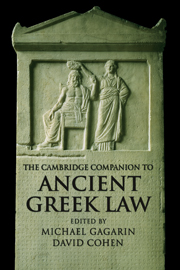Book contents
- Frontmatter
- Introduction
- Part 1: Law in Greece
- Part 2: Law in Athens I: Procedure
- 5 Law and Oratory at Athens
- 6 Relevance in Athenian Courts
- 7 Differentiated Rhetorical Strategies in the Athenian Courts
- 8 The Role of the Witness in Athenian Law
- 9 Theories of Punishment
- 10 The Rhetoric of Law in Fourth-Century Athens
- Part 3: Law in Athens II: Substantive Law
- Part 4: Law outside Athens
- Part 5: Other Approaches to Greek Law
- Index
8 - The Role of the Witness in Athenian Law
from Part 2: - Law in Athens I: Procedure
Published online by Cambridge University Press: 28 August 2006
- Frontmatter
- Introduction
- Part 1: Law in Greece
- Part 2: Law in Athens I: Procedure
- 5 Law and Oratory at Athens
- 6 Relevance in Athenian Courts
- 7 Differentiated Rhetorical Strategies in the Athenian Courts
- 8 The Role of the Witness in Athenian Law
- 9 Theories of Punishment
- 10 The Rhetoric of Law in Fourth-Century Athens
- Part 3: Law in Athens II: Substantive Law
- Part 4: Law outside Athens
- Part 5: Other Approaches to Greek Law
- Index
Summary
The authority of the great philosopher Aristotle and the suggestive power of his systematic mind misled the compilers of older handbooks on the law in Athens and clouded their view of Athenian legal procedure. In their chapters on evidentiary procedure, they accept the five “nonartistic proofs” (atechnoi pisteis) canonized by Aristotle in his Rhetoric (1375a24): nomoi, martyres, synthekai, basanoi, and horkos (laws, witnesses, contracts, confessions under torture, and oath). More recent studies have recognized that only one form of evidence, witnesses, had legal significance in the practice of the Athenian jury courts. Aside from a few regulations governing witness testimony, Athenian law had no legally specified rules of evidence. We cannot take the various methods of finding truth in modern law as a natural given, nor can we uncritically apply those standards to the large Athenian courts (dikasteria). In Athenian law, the principle of determining the truth is not primary, but rather the principle of equal opportunity: both prosecutors and defendants should have a fair opportunity to present their positions to a body of fellow citizens selected objectively and not influenced by bribery or pressure. This assembly of jurors decides the case immediately after the speeches, rendering their first and final decision without deliberating or giving reasons.
- Type
- Chapter
- Information
- The Cambridge Companion to Ancient Greek Law , pp. 146 - 169Publisher: Cambridge University PressPrint publication year: 2005
- 13
- Cited by

